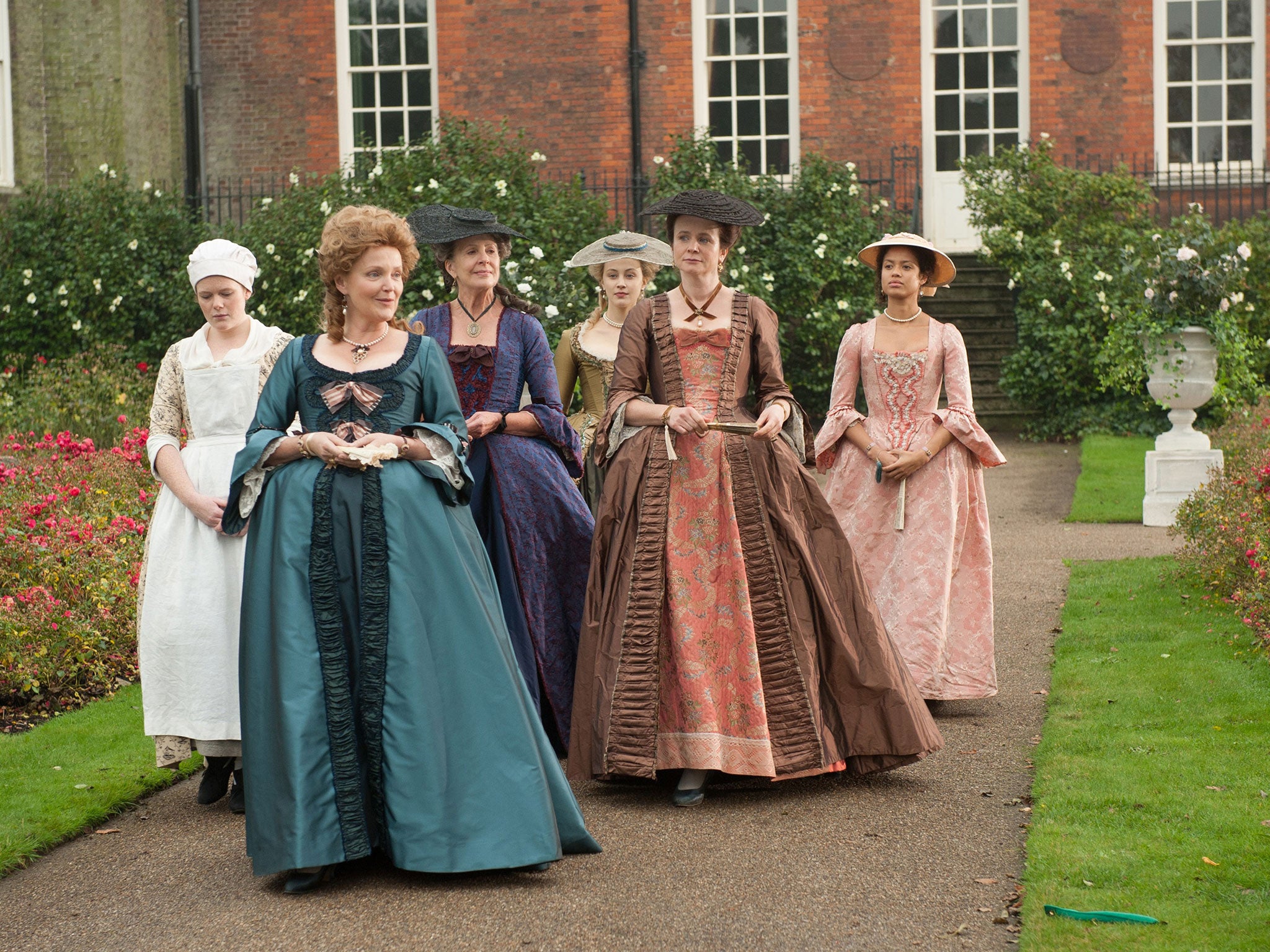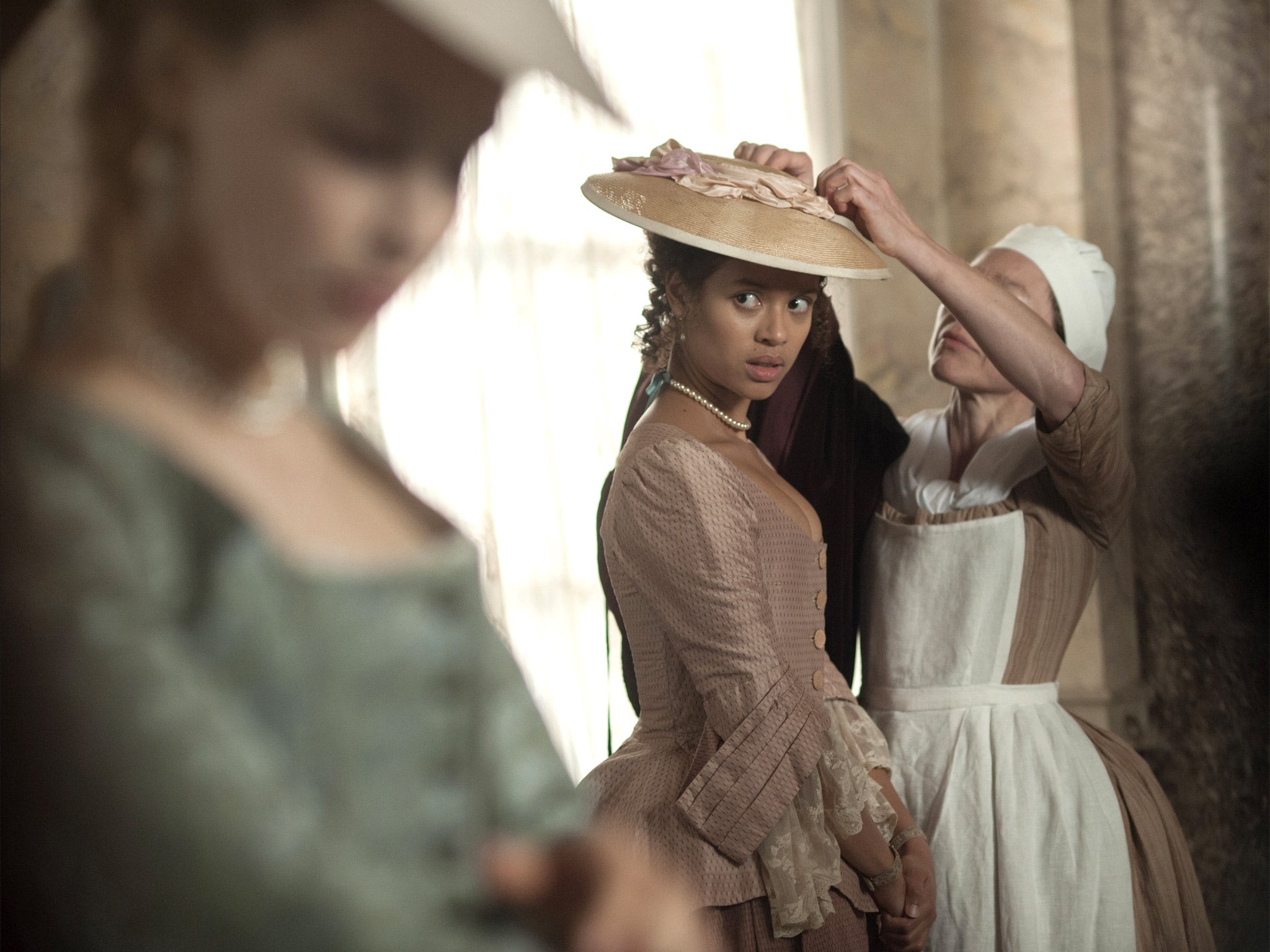Belle, film review: Pride and prejudice in a better class of costume drama
(12A) Amma Asante, 104 mins Starring: Gugu Mbatha-Raw, Tom Wilkinson, Emily Watson, Sarah Gadon

Your support helps us to tell the story
From reproductive rights to climate change to Big Tech, The Independent is on the ground when the story is developing. Whether it's investigating the financials of Elon Musk's pro-Trump PAC or producing our latest documentary, 'The A Word', which shines a light on the American women fighting for reproductive rights, we know how important it is to parse out the facts from the messaging.
At such a critical moment in US history, we need reporters on the ground. Your donation allows us to keep sending journalists to speak to both sides of the story.
The Independent is trusted by Americans across the entire political spectrum. And unlike many other quality news outlets, we choose not to lock Americans out of our reporting and analysis with paywalls. We believe quality journalism should be available to everyone, paid for by those who can afford it.
Your support makes all the difference.For British film-makers, the costume drama is a means of escape. By filling the screen with bonnets, brooches and hansom cabs while decking out characters in wigs and crinolines, they avoid pressing contemporary issues.
Amma Asante's second feature is unusual in that it offers traditional genre pleasures – meticulous period detail, stirring character performances, heritage trappings – and yet it deals frankly with race, class and gender. It boasts the nuanced dialogue and courtship rituals you expect to find in Jane Austen adaptations but it isn't based on a classic novel. The screenplay by Misan Sagay takes its inspiration from a late 18th-century painting of Lady Elizabeth Murray, great niece of the Earl of Mansfield, and her cousin, Dido Elizabeth Belle. In the painting, the two young women are beautiful, mischievous and flirtatious. They appear as equals. It also so happens that Dido is black.
Belle is very far removed from Asante's Bafta-winning debut feature, A Way of Life (2004), a social-realist drama that looked at racism, anti-Muslim prejudice and youth unemployment in a deprived town in South Wales. The setting this time round is upper class 18th-century London. Dido (Gugu Mbatha-Raw) is the illegitimate mixed-race daughter of Captain John Lindsay (Matthew Goode). She is taken to London as a child and is brought up at Kenwood House in Hampstead by the Earl of Mansfield (Tom Wilkinson), alongside her cousin, Elizabeth Murray (Sarah Gadon).
Dido is both blessed and cursed. She is accepted into the Earl's family as an (almost) equal member. She is too high in status to dine with their servants and yet too low to dine with the family when there are guests. "She is black!" one character exclaims in disbelief after seeing her for the first time. She is referred to as "Lord Mansfield's infamous mulatto".

In the period in which the film is set, the early 1780s, slavery is a major driver of the British economy. As Dido is coming to adulthood, the notorious case of the "Zong massacre" is being contested in the courts. During the last voyage of the Zong, a British-owned ship, 142 African slaves had been thrown overboard. The owners had claimed that there was not sufficient water to keep the slaves alive and had then, perversely, tried to claim on their insurance for the men they had killed (their human cargo).
Belle attempts (not altogether successfully) to combine the story of the Zong trial with an account of Dido's life as a young woman in upper-class London. At times, it seems as if two separate films have been grafted together. In one, Dido and Lady Elizabeth are young ingenues looking for potential husbands. In the other, a case is passing through the courts which could lead to the abolition of slavery. We hear references to the horrific conditions in which the slaves were kept in the Zorn but most of the film is set in the drawing rooms, dining rooms and gardens of aristocratic homes. The main link between the two worlds is Lord Mansfield, who is Lord Chief-Justice.
The film is filled with redoubtable British character actors. Tom Wilkinson gives a subtle performance as Lord Mansfield, engaged in his own private battle between curmudgeonliness and enlightenment. Miranda Richardson evokes memories of Blackadder with her comic turn as the mercenary Lady Ashford, on the prowl for well-born daughters for her two sons, Oliver (James Norton) and James (Tom Felton). There's a hint of Edith Evans about Emily Watson's steely and protective Lady Mansfield and Penelope Wilton is equally formidable as Lord Mansfield's unmarried sister. For all the courtly language, it is made very clear that there is a ruthless jostling for position in society and that young men without inheritances will go to extreme lengths to secure their positions.
Mbatha-Raw brings fieriness and sensitivity to Dido, who could have seemed one-dimensional if not played with conviction. She gives a sense of the inner life of a character who is proud and defiant but also trying to work out where she stands in an openly racist society.
Belle seems a little soft-centred, at least compared to a film as tough as 12 Years a Slave. The romantic subplot is conventional. Dido becomes a desirable catch because of her inheritance and yet her affections lie with John Davinier (Sam Reid), the impoverished son of a clergyman. He shares her sense of social injustice and feeling of not belonging. This is a feelgood movie in which we know that the most principled characters will triumph (or, at least, marry happily). The screenplay ends abruptly and leaves it to the intertitles to explain what happened to the characters whose plot lines it doesn't have time or inclination to pursue.
Even so, it is a mystery as to why Asante, a former child star on Grange Hill, has had to wait a decade between directing her first and second features. Perhaps today's British film industry has the same closed-minded attitudes about gender and race as the 18th-century high-society London recreated here. With Belle, Asante has succeeded in making a sweeping costume drama that confronts questions of race and gender head on – something that Merchant Ivory films rarely managed to do.
Join our commenting forum
Join thought-provoking conversations, follow other Independent readers and see their replies
Comments